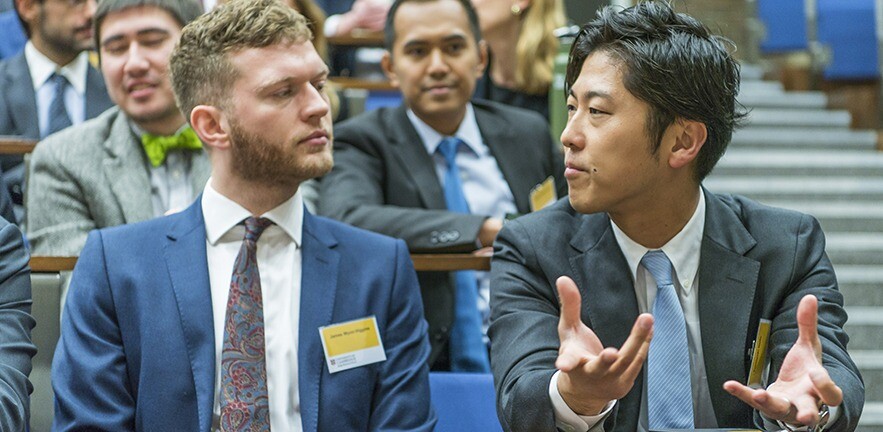Cambridge MBA students enthusiastically take part in the annual Cambridge-McKinsey Risk Prize, which they see as a valuable opportunity to zone in on areas of interest and apply their experience and learning beyond the MBA itself.
The Cambridge-McKinsey Risk Prize is held annually and culminates in the Risk Summit held in June, where the prize winners are announced each year.
Risk prize essays have addressed legal implications of cryptocurrency, climate risk of stranded assets, strategic risk in airlines, railroads and hospitals, risk factors around disruptive digital technology and biodiversity, indeed any topic where the recognition and management of risk provides value.
Academic Director of the Cambridge Judge Centre for Risk Studies, and Professor of Operations Research, Danny Ralph explains,
“The research programme is concerned with systematic risks, such as how the impacts of catastrophic events ripple across an increasingly connected world with consequent effects on the global economy, financial markets and corporations. The Cambridge-McKinsey Risk Prize is a platform to highlight risk concerns and solutions from a management perspective – whether in the context of creating or protecting opportunity, for individuals or firms or systems.”
MBA Alumnus Bradley Gibb (MBA 2019) received an Honourable Mention in the 2020 Risk Prize competition for his report on plastic risk in the UK drinks industry.
Looking at everything from plastic packaging to container deposit return schemes, Bradley examined the risk factors and the greater producer responsibility that was currently impacting the economics of the industry’s operating model. Bradley goes on to discuss many activities that could possibly be introduced to counter the potential impact of the perceived risks.
Bradley explains, “I was attracted to the Risk Prize as I had previously only had a small amount of exposure to corporate risk management during my career and I wanted to incorporate the further study of this discipline into my Cambridge MBA experience”.
“The prize dovetailed well with the Risk Management Elective available through the renown Cambridge Judge Centre for Risk Studies, and it offered me the opportunity to submit a report on something that I am passionate about.”
Bradley came to the MBA with a background in accounting as well as several years in finance across the FMCG industry, including a procurement role with global beverage giant Coca-Cola Amatil. Bradley, an Australian, had worked across both developed and developing markets, his interest in plastic and sustainability coming to a head when he was involved in the purchase of recycled PET resin across 6 countries.
“The topic I chose to enter into the Risk Prize centred on plastic risk for beverage companies in the UK, a very current and relevant challenge.
“As a result, I had a lot of support from individuals in the industry who were keen to hear about my learnings in exchange for their input into the report. While reaching out and conducting interviewing was a time-consuming process, it was also one of the most rewarding experiences of my Cambridge MBA.”
Taking risk insights into a future career
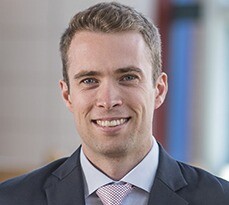
Bradley continued to support his area of interest, as well as developing his expertise further across his MBA year. He chose the Strategy Concentration and was part of the MBA Global Consulting Project team working with Nestle to investigate container deposit return schemes in the USA. He then took his practical experience further during his MBA by taking up a summer internship with Cambridge startup, Xampla, a company developing natural alternatives for plastic.
“Ultimately, I was able to use the Risk Prize as a platform to expand my UK network in the beverages industry.”
Bradley is now based in London as Project Lead with the British producer of premium drinks mixers Fever Tree.
An opportunity for deeper thinking
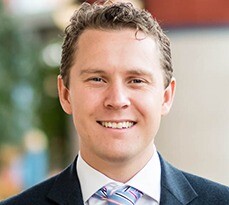
Staying in the food and drinks industry, British-born alumnus Mark Porter (MBA 2018) received an Honourable Mention for his report on the effect of commodity price risk on vanilla farmers in Madagascar.
Mark’s paper asked whether an alignment of a number of risk factors provided a path forward, by providing incentives for both farmers and buyers to work together toward a more sustainable future.
“Coming from an operational background in oil and gas, I was well aware of the use of risk in a project management context and for health and safety reasons. The wide scope of the Risk Prize, however, was an ideal opportunity to discuss the topic of risk more broadly, to consider other forms of risk and think about how they might manifest in completely different environments.”
Mark continues, “Entering the Risk Prize competition was a great example of the way taking the time to do an MBA gave me room to step back from my career and to explore subjects I had previously little knowledge of”.
“Over the course of the Cambridge MBA, I found that the research and thought needed to structure an argument into a long-form essay led to a deeper understanding of a topic.”
Mark explains, “For the Risk Prize report I returned to a topic I had explored during the Entrepreneurship course on the MBA programme”.
For Mark being part of the Risk Prize 2019, a University-wide competition, was a real honour. He enjoyed working alongside other students from a wide range of disciplines, across the wider University of Cambridge community.
Mark, now Marketing Manager for the data tech development company, GeoSpock, based in the UK, comments on a future career in the risk sector:
“Although I don’t work directly in a risk sector at present, I think an understanding of risk perception and its impact on human and organisational behaviour is something that is applicable in careers across the full spectrum of industries and functions.”
Building on risk management MBA learnings
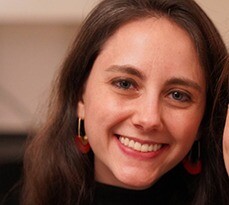
Class of 2015 alumna Simone Goldstein, based in New York, received the Honourable Mention in the summer of 2016.
“The Cambridge-McKinsey Risk Prize was an excellent opportunity to build upon the core foundation of the Risk Management course I took at Cambridge during my MBA. The Risk Management course provided a framework through which to assess challenges I had identified in the media industry, while the Risk Prize allowed me to dive deeper and provide further learnings and recommendations to the risks I had identified,” she explains.
Before her MBA Simone was a media strategy manager working in New York, and she focused her Risk Prize report on the internal and external risks facing media agencies at the time.
Now working as a product manager at an online behaviour tech company, Simone concludes:
“Today, I work at a small company where quick and fluid decisions are made, and I pull from my experience in both the MBA risk teachings, as well as the Risk Prize to help evaluate company direction and strategic decisions.”
Turning the tables on risk studies
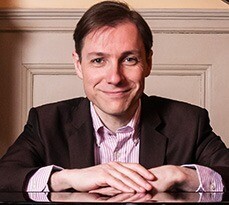
Founder and entrepreneur in the UK performing arts sector, alumnus Stuart Barr (MBA 2016) received the award of Honourable Mention, summer 2017.
Stuart wrote about the veteran singer Dame Shirley Bassey in the context of performance risk and more specifically how the Oscars could redefine our understanding of risk.
Stuart explains: “I was attracted by the challenge of seeing risk defined only as a threat, not an opportunity. This is something completely contrary to my professional experience as a conductor working in live music, where the positive side of jeopardy is an essential part of achieving world-class performances. I wanted to redefine how we think of risk in an academic sense.”
In 2013 Stuart, as musical director to Dame Shirley Bassey at the time, conducted her live for the global audience at the Academy Awards ceremony of that year.
“At the Oscars ceremony, ‘live’ performances are normally pre-recorded and lip-synched to reduce the risk of making mistakes. We, on the other hand, insisted on performing live because of the upside of jeopardy, resulting in universal media acclaim at the resulting performance. Hence, creating a case study out of the Oscars seemed like the perfect opportunity to support the argument for contrarian thinking.”
The Risk Prize in the context of the MBA year
On being awarded the Honourable Mention prize Stuart says, “Given that what I was proposing was a fundamental redefinition of the basis of academic risk studies, I was thrilled that the Cambridge-McKinsey Risk Prize were interested enough in the topic to put me through as a finalist in the competition”.
“I was delighted to think that it might encourage others to explore the upside of risk in other settings. I would thoroughly recommend entering the Risk Prize – particularly if you can find new ways to think about the topic to add to the literature.”
As our MBA students graduate into a global pandemic, it has become even more essential to explore risk and all its associated impact.


